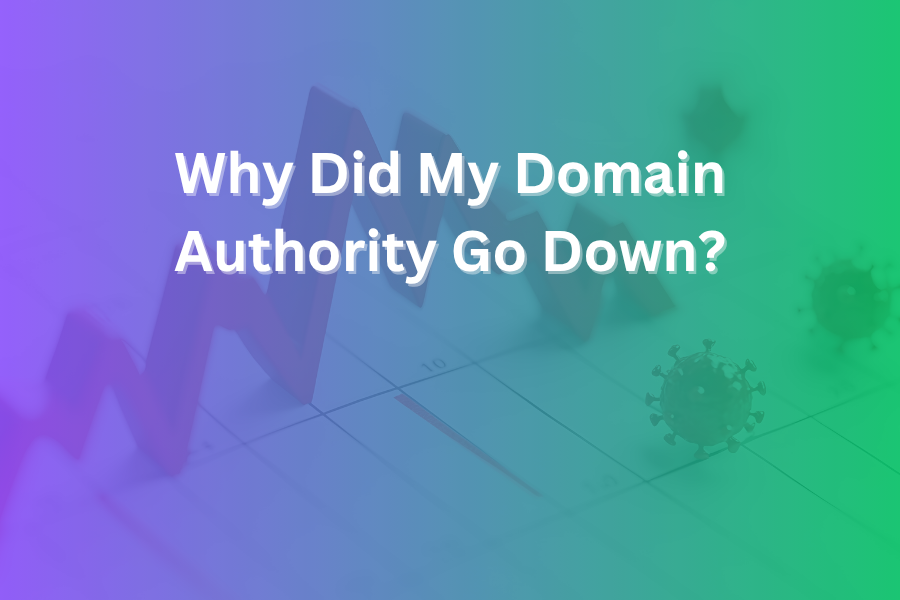In business and digital marketing, your domain authority (DA) reflects your site’s perceived strength and credibility. When it starts to slip, it can feel like the rug’s been pulled out from under you. The drop might signal weaker search visibility, lower traffic, or lost rankings.
In this article, you’ll learn why your domain authority went down, how to diagnose the root causes, and what you can do to rebuild your authority promptly.
What Does “Domain Authority” Really Mean?
Domain authority is a score (typically 1 to 100) created by third-party SEO tools that estimates how well your domain might perform in search rankings. It is not a metric used by Google itself, but it incorporates factors like your link profile, site age, and overall trustworthiness.
Because DA is a composite indicator calculated by these tools, fluctuations often reflect changes in their link index or your site’s link context rather than a direct penalty. Recognizing this distinction keeps you from overreacting.
Top Reasons Your Domain Authority Went Down
Loss of High-Quality Backlinks
When authoritative sites stop linking to you—or convert links from do-follow to no-follow—you lose link equity and your DA may drop. Check your referring domains: if you once had links from high-ranking or trusted niche sites and you’ve lost those, that’s a common trigger.
Your Competitors Improved Their Link Profiles
In a fixed scoring system, your DA can slide even if you didn’t do anything wrong—simply because others gained stronger backlinks and moved ahead.
Acquisition of Spammy or Low-Quality Links
If you picked up toxic backlinks—through link exchanges, blog networks, or directory spam—your profile’s health takes a hit and your authority metric may decline.
Technical or Crawling Issues on Your Site
Site downtime, broken pages, incorrect redirects, robots.txt errors, or other crawl hindrances can interfere with indexing and reduce link value flow. When your website has accessibility issues, tools calculating domain authority detect them as quality concerns.
Content Quality or Relevance Decline
If your site’s content becomes outdated, off-topic, or fails to meet user intent, engagement drops. Fewer backlinks are earned, and your authority may decline. Keeping content fresh and aligned with your audience’s needs is key.
Algorithm or Tool Update Fluctuations
Sometimes the drop isn’t your fault. Domain authority tools often refresh their link index or change their scoring system. When that happens, your score can fluctuate even if your site remains the same.
Domain Age, History, or Trust Issues
Older domains with consistent performance tend to maintain higher authority. If your domain was recently rebranded, penalized, or had downtime, that history can temporarily weaken your DA.
How to Diagnose the Drop — A Step-by-Step Checklist
- Review your site analytics first. Check if organic traffic actually dropped, or if only the DA metric changed. If traffic is stable, it may be a reporting adjustment, not a penalty.
- Use a backlink audit tool to check for lost links, shifts in referring domain quality, or sudden spikes of low-quality links.
- Inspect your site’s health. Look for crawl errors, slow loading pages, or sitemap issues that might hinder search engines.
- Evaluate your content. Has publishing slowed? Are your articles outdated, irrelevant, or missing internal links?
- Check competitor performance. If others have improved, your relative score can decline even if your site stayed the same.
- Note any tool updates. Moz, Ahrefs, and similar tools frequently refine their data, which may shift your DA.
- Audit for unnatural backlinks. Negative SEO or poor link building can flood your profile with spammy links.
What You Can Do to Recover and Rebuild Authority
Reclaim Lost High-Value Links
Reach out to sites that removed or changed your backlinks. Rebuilding lost relationships and earning replacements through fresh collaborations can help restore your authority.
Disavow or Remove Toxic Links
Identify and disavow spammy or irrelevant backlinks that might be harming your credibility. This tells search engines not to associate your site with those poor-quality sources.
Publish Fresh, Valuable Content Consistently
Keep publishing. New, insightful, and original content attracts organic backlinks naturally. Update older posts with current data and examples to keep them relevant.
Optimize Technical SEO and User Experience
Ensure your website loads quickly, is mobile-friendly, and free from crawl errors. A technically sound site builds trust with both users and search engines.
Strengthen Internal Linking and Structure
Link strategically between related pages. A good internal linking structure helps distribute link equity, improving your site’s overall authority.
Monitor Competitors and Learn from Their Wins
Watch what high-ranking sites in your niche are doing—content topics, backlinks, and structure. Learn from their strategies and adapt them to your own site.
Be Patient and Track Metrics Over Time
Rebuilding authority takes time. Monitor progress monthly rather than daily, and focus on long-term improvements instead of chasing short-term metrics. Remember, DA is a reflection of strong SEO practices, not a ranking guarantee.
When a Drop Isn’t a Crash
A small dip in domain authority isn’t always bad. Authority metrics fluctuate, and small changes are normal. If your organic traffic and rankings remain steady, it might just be a temporary shift.
Focus less on the number itself and more on improving the core elements that influence it: backlinks, content, site health, and engagement. If those remain strong, your domain authority will naturally rise again.
Key Takeaways
When you ask “why did my domain authority go down?”, the answer usually lies in one or more of these factors:
- Lost high-quality backlinks
- Technical or crawling issues
- Poor or outdated content
- Competitor improvements
- Algorithm or tool updates
Your goal is to pinpoint the reason, correct it, and stay consistent. View DA as a guide, not a verdict. Audit your backlinks, refine your SEO foundation, and keep producing high-value content. Over time, your authority will recover and surpass where it was before.

